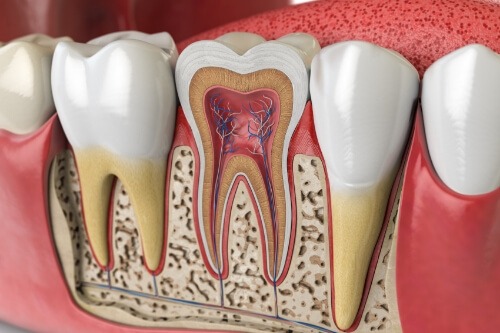Root Canal Treatment Pecan Grove
Quick & Effective Toothache Relief

Although there are several reasons why root canal treatment may be necessary, it is usually required because the pulp of the tooth is affected and requires treatment. Oftentimes, the tooth is causing severe pain to the patient and will get worse without intervention.
Root canal treatment may sound scary and daunting, but it is actually a fairly straightforward process. The majority of the time, the procedure is painless. Read on to find out more about root canal treatment in Pecan Grove.
Root Canal Treatment Explained

- After the patient is numbed, the necrotic pulp and root tissue is removed and the interior of the tooth is disinfected.
- The root canal system of the tooth is sealed with biocompatible materials to prevent contamination from bacteria.
- The tooth is crowned to provide full coverage protection and prevent tooth fracture. Like the biocompatible material inside the tooth, the crown also helps prevent contamination of the tooth’s interior.
What are the reasons a tooth needs root canal treatment?

- Decay or tooth fracture that has extended to the pulp.
- Severe pulpal irritation, known as irreversible pulpitis, will eventually lead to tooth necrosis.
- Tooth infection or necrosis can be caused by bacteria or severe trauma.
If I need a root canal due to infection, can't I just take antibiotics?

Antibiotics are effective at fighting bacteria, but they have one weakness in treating a tooth infection: they must be transported to the infected site through blood flow. The pulp tissue in a necrotic tooth is dead, which means there is no longer any blood circulation into the tooth. Although antibiotics may help treat any flare-ups, they will not be able to attack the bacteria residing inside the tooth itself.
What happens if I don't get the root canal?

Failure to get a root canal will generally result in the problem getting worse. If the tooth is necrotic, this can mean the spread of the infection, which may lead to an abscess or facial cellulitis. Once the infection has spread to the soft tissues, there is a risk for serious, sometimes fatal infections.
One alternative to getting a root canal is to extract the offending tooth since this would remove the source of the infection and allow the body to heal itself. If you decide to go this route, implants can serve as an excellent option to restore the missing tooth.
Do I NEED to get a crown after a root canal?

Most of the time it is best to crown a tooth that has received root canal treatment. Typically, a tooth that received RCT had significant decay and was missing a large portion of tooth structure. Repairing such a large space with filling material raises the risk of tooth damage or coronal leakage.
The term “coronal leakage” refers to the contamination of the root canal treatment through openings in the restoration protecting the tooth and is one of the major causes of root canal failure. A crown provides full coverage protection and is often the best way to prevent coronal leakage.
